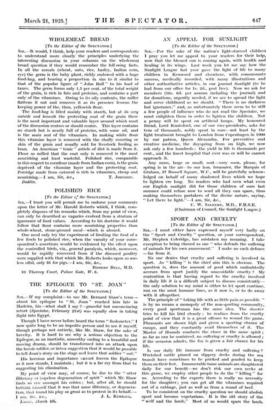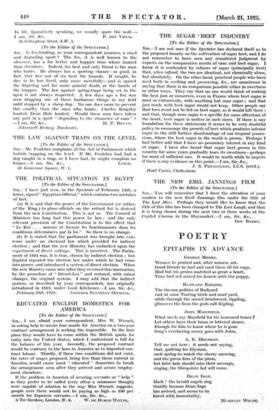SPORT AND CRUELTY [To the Editor of the SPECTATOR.] SIR,-I
must either have expressed myself very badly on the " Sport and Cruelty " question, or your correspondent, Mr. Stephen Coleridge, has mistaken my meaning. I take exception to being classed as one " who defends the suffering of animals for his own amusement." I make no such defence —far from it.
No one denies that cruelty and suffering is involved in sport. As " killing " is the chief aim this is obvious. The question is, does the amount of good which undoubtedly accrues from sport justify the unavoidable cruelty ? My contention is that having regard to the cruelty involved in daily life it is a difficult subject to discuss consistently— the only solution to my mind is either to let sport continue, run on the most humane lines, as it now is, or to do away with it altogether.
The principle of " taking life with as little pain as possible is by no means a monopoly of the non-sporting community, every good sportsman has the same idea. The shooter tries to kill his bird cleanly ; he realizes from the cruelty point of view that it is a great offence to wound the game. Pheasants are shown high and given a sporting chance of escape, and they constantly avail themselves of it. The Master of Hounds conducts the chase in the same spirit ; as far as can be contrived, no suffering or cruelty is allowed ; if the occasion admits, the fox is given a fair chance for his life.
Is our daily life immune from cruelty and suffering ?
Wretched cattle pinned on slippery decks during the sea transit have sometimes to be pricked and goaded to keep them on their feet. Innumerable tame animals are slaughtered daily for our benefit—we don't risk our own necks at this game, we employ other people to do the " killing " for us. According to the experts there is really no necessity for the slaughter ; you can get all the vitamines required out of a cabbage, just as well as from a round of beef.
To be consistent on the cruelty question we should abolish sport and become vegetarians. It is the old story of the " wolf and the lamb." Most -of us would spare the lamb. In life, figuratively speaking, we usually spare the wolf.—
I am, Sir, &c., F. DES ITCEUX. 50 Gillingham Street, S.W. 1.























































 Previous page
Previous page